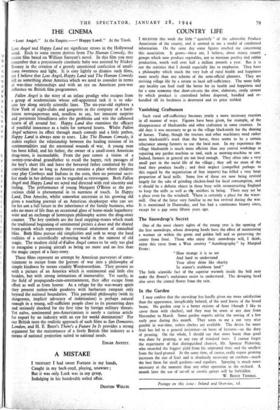ME CINEMA
Lost Angel." At the Empire.—" Happy Land." At the Tivoli.
Lost Angel and Happy Land are significant straws in the Hollywood wind. Each to some extent derives from The Human Comedy, the recent film based on William Saroyan's novel. In this film you may remember that a precociously cinematic baby was assisted by Mickey Rooney in the creation of a grossly unrationed confection of small- town sweetness and light. It is easy lightly to dismiss such films, yet I believe that Lost Angel, Happy Land and The Human Comedy tell us something about America which we need to consider in terms of war-time relationships and with an eye on American post-war influence on British film programmes.
Fallen Angel is the story of an infant prodigy who escapes from a group of academicians whose self-appointed task it is to edu- cate her along strictly scientific lines. The six-year-old explores a New York of night-clubs and gangsters in the company of a hard- bitten newspaperman and, needless to say, her innocent surprise and persistent friendliness solve the problems and win the calloused hearts of all around her. Happy Land also examines the efficacy of youthful innocence as a balm for tortured hearts. Whilst Fallen Angel achieves its effect through much comedy and a little pathos, Happy Land is always near to tears. Like The Human Comedy, it makes explicit the relationship between the healing mission of its sentimentalities and the emotional wounds of war. A young man has been killed, and his father, the owner of a small-town American drug-Store, is inconsolable. From the past comes a vision of a twenty-year-dead grandfather to recall the happy, rich passages of the boy's short life and leave the bereaved father comforted by the conviction that so long as America remains a place where children may play Cowboys and Indians in the corn, then no personal sacri- fice made in her defence can be regarded as extravagant. Both Fallen Angel and Happy Land are acted and directed with real sincerity and feeling. The performance of young Margaret O'Brien as the pre- cocious child is phenomenal in its sureness of touch. In Happy Land, Don Ameche, whilst somewhat uncertain in his growing old gives a touching portrait of an American shopkeeper who can see for his son a full future in the inheritance of the family business, who asks no more of life than an occasional glass of home-made loganberry wine and an exchange of homespun philosophy across the drug-store counter. The key symbols are the local stepping-stones which mark the traditional beginning of sentimental picnics a deux and the shared front-porch which represents the eventual attainment of connubial bliss. Both films pursue old simplicities and seek to wrap the hard realities of a scientifically advancing world in the raiment of old magic. The modern child of Fallen Angel cornea to be only too glad to recognise a passing aircraft as being no more and no less than the magic carpet of a fairy-story.
These films represent an attempt by American purveyors of enter- tainment to escape from the Donors of war into a philosophy of simple kindness by means crudely Wordsworthian. They present us with a picture of an America which is sentimental and little else besides, but with strong intimations of immortality. Yet surely, in the field of propaganda-cum-entertainment, they offer escape from effort as well as from horror. As a refuge for the war-weary spirit they present nation-wide goodness with barbarism rampant only beyond the national boundaries. This parochial philosophy (with its dangerous, implicit advocacy of isolationism) is perhaps natural enough in a young, self-sufficient people close to its pioneering days and seriously shocked for the first time by foreign military threats. Yet naive, sentimental pro-Americanism is surely a curious article for export by an industry with an eye for world domination? For our British taste the realistic approach of such films as San Demetrio, London, and H. E. Bates's There's a Future In It provides a strong argument for the maintenance of a lively British film industry as a means of national projection suited to national needs.
EDGAR ANSTEY.


























 Previous page
Previous page